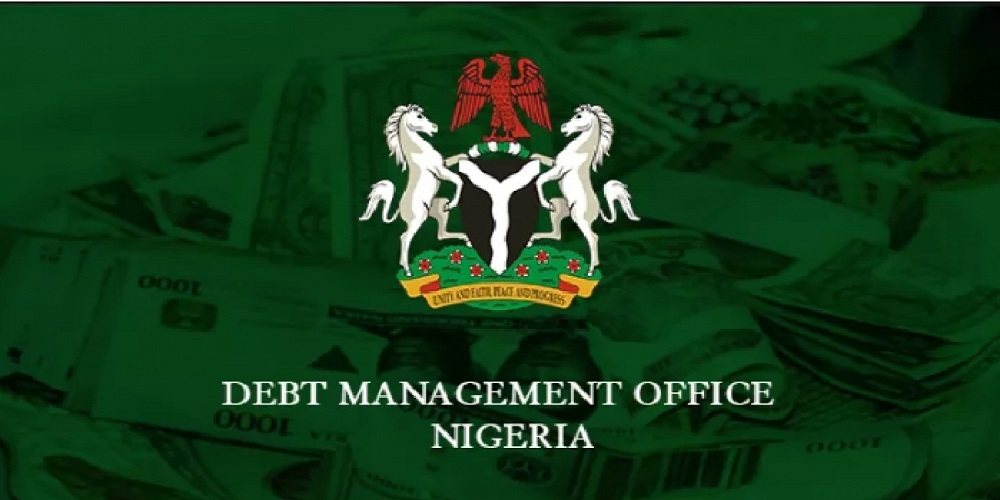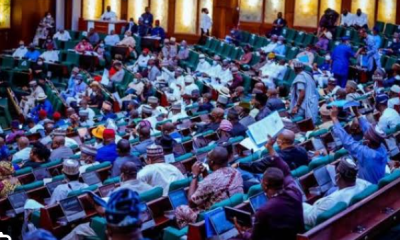Economy
13 new governors borrowed N226.8bn in six months – DMO

In the first six months after taking office, 13 new state governors collectively borrowed N226.8bn from domestic and external financiers.
This emerged as findings by Sunday PUNCH showed that 16 state governors also increased the debt profile of their states by N509.3bn with domestic and external debt of N243.95bn and $298.5m (N265.37bn), respectively.
The external debt was calculated based on the exchange rate of N889/$ used by the Debt Management Office in its report.
This is according to an analysis of the latest sub-national debt reports released by the DMO.
The sub-national debts are classified into domestic borrowings from local creditors and external borrowings from international creditors like the World Bank and the International Monetary Fund.
The domestic and external debts published on the DMO’s website were as of December 30 and June 30, 2023, respectively.
The states, which include Benue, Cross Rivers, Katsina, Niger, Plateau, Rivers, Zamfara, and the Federal Capital Territory, got N115.57bn from domestic creditors, while governors of Ebonyi, Kaduna, Kano, Niger, Plateau, Sokoto, Taraba and Zamfara states borrowed $125.1m (N111.24bn) from external sources.
For the sub-nationals, a further breakdown of the data showed that Cross Rivers Governor, Bassey Otu, took the highest loan, with N16.2bn from domestic and $57.95m from foreign creditors between June and December 2023.
Katsina State followed with the debt surging by N36.93bn from N62.37bn to N99.3bn by December 2023.
Third on the list is Niger State, with a domestic debt of N17.85bn, surging from N121.95bn in June 2023 to N139.8bn by December of the same year.
Plateau got N16.32bn; Rivers borrowed N7.07bn; Zamfara, N14.26bn; and the FCT under the leadership of Nyesom Wike borrowed N6.75bn from domestic creditors.
For foreign debt, Governor Francis Nwifuru of Ebonyi State accumulated external debt of $37.54m, while Governor Uba Sani of Kaduna State borrowed $17.69m from external financiers.
Similarly, the governors of Kano borrowed $6.6m; Niger, $1.27m; Plateau, $831,008; Sokoto, $499,472; Taraba, $1.51m; and Zamfara, $655,563, from external sources.
Despite declarations by the administration of President Bola Tinubu that it would not continue with the massive borrowings of the previous government to fund its expenditures, the latest developments show that the new government is sticking to the controversial policy amidst increased revenue.
In 2023, state governors got the most Federal Account Allocation Committee allocations in at least seven years. The rise in FAAC allocations to the three tiers of government, especially the states, followed the removal of subsidy on petrol and currency reforms by the Tinubu administration. The reforms have reportedly led to a 40 per cent boost in income.
An analysis of the 2023 FAAC monthly allocations revealed that the sub-national and local government councils got the highest allocation of N627.73bn in September, followed by N610.5bn in December, N555.75bn in August, N533bn in November, N514bn in July and N497.97bn in October.
Economy
CBN launches new platform, targets $1bn monthly diaspora remittances

The Central Bank of Nigeria, in collaboration with the Nigeria Inter-Bank Settlement System, has launched the Non-Resident Bank Verification Number platform, an initiative aimed at enhancing financial access for Nigerians in the diaspora.
The platform, which enables Nigerians abroad to obtain their Bank Verification Number remotely, removes the need for physical presence in Nigeria.
Speaking at the event in Abuja on Tuesday, CBN Governor, Mr. Olayemi Cardoso, described the platform as a key milestone in the country’s financial inclusion journey.
He noted that the NRBVN would ease the long-standing challenges faced by Nigerians in the diaspora who previously had to be physically present in Nigeria for BVN registration.
“For too long, many Nigerians abroad have faced difficulties accessing financial services at home due to physical verification requirements,” Cardoso said. “The NRBVN changes that. Through secure digital verification and robust Know Your Customer processes, Nigerians worldwide will now be able to access financial services more easily and affordably.”
The governor added that the NRBVN was not just a solution for financial access, but a step towards a more inclusive, innovative, and prosperous financial ecosystem.
“We are building a secure, efficient, and inclusive financial ecosystem for Nigerians globally,” he remarked. “This platform is not just about financial access, it’s about national inclusion, innovation, and shared prosperity.”
Cardoso also highlighted the growth in remittance flows, which increased from $3.3bn in 2023 to $4.73bn in 2024. He attributed this rise to recent reforms, including the introduction of the willing buyer, willing seller FX regime.
With the launch of the NRBVN, the CBN is targeting $1bn in monthly remittances.
“With the introduction of NRBVN and complementary policy measures, we are optimistic about achieving our ambitious target of $1bn in monthly remittance flows, a goal we believe is entirely achievable given the growing trust and convenience in formal remittance channels,” Cardoso said.
The event also featured a presentation by the Managing Director/CEO of NIBSS, Mr Premier Oiwoh, who detailed the technical and operational aspects of the NRBVN platform.
Oiwoh emphasised that the platform adheres to global standards, incorporating stringent Anti-Money Laundering and KYC compliance protocols to ensure transparency and security.
The Deputy Governor, Economic Policy, CBN, Mr Muhammad Abdullahi, also addressed the gathering, describing the NRBVN as a transformative tool for enhancing the banking experience for Nigeria’s diaspora.
He urged stakeholders to collaborate in refining the platform to meet the evolving needs of the diaspora community.
He further emphasised that the initiative would strengthen economic ties between Nigeria and its global citizens, and ultimately drive sustainable economic growth.
“Together, we stand at the threshold of a new era, poised to deepen the trust, enhance remittance growth, and forge a stronger, more meaningful connection between Nigeria and its global citizens,” Abdullahi said.
The NRBVN platform is part of a broader framework that includes the Non-Resident Ordinary Account and Non-Resident Nigerian Investment Account, which provide Nigerians in the diaspora with access to savings, mortgages, insurance, pensions, and investment opportunities in Nigeria’s capital markets.
Under current regulations, diasporans will have the flexibility to repatriate the proceeds of their investments.
The launch of the NRBVN platform marks a crucial step in the CBN’s efforts to improve financial inclusion and harness the economic potential of Nigeria’s diaspora.
Economy
SEE Black Market Dollar (USD) To Naira (NGN) Exchange Rate Today 12th May 2025

Below is the black market exchange rate for the US Dollar to Naira as of Sunday, May 11, 2025. These are the rates at which you can exchange your dollars for naira.
Black Market Dollar to Naira Exchange Rate (Aboki FX)
According to sources at the Bureau De Change (BDC) in Lagos, the dollar was bought at ₦1625 and sold at ₦1630 on Sunday, May 11, 2025.
Important Notice:
The Central Bank of Nigeria (CBN) does not officially recognize the parallel market, also known as the black market. The CBN advises anyone seeking foreign exchange to do so through their commercial banks.
Dollar to Naira Exchange Rates Today
Market Type Buying Rate Selling Rate
Black Market (Aboki) ₦1625 ₦1630
CBN Official Rate ₦1608–₦1614 –
Please note: Exchange rates may differ depending on the vendor or location, and the rates presented here might vary slightly from the actual rate at the point of transaction.
Economy
Naira Gains Slightly Against Dollar On May 8, 2025

On Thursday, May 8, 2025, the naira is exchanging for ₦1,627 to 1 US dollar at the parallel market (black market) in Nigeria.
This reflects the current rate at which individuals are trading dollars for naira outside of official financial institutions.
This means that for every one dollar, you can get the equivalent in naira of ₦1,627 on May 8, 2025, showing a very slight improvement compared to the previous day, indicating a momentary easing of pressure on the naira against the dollar.
Thursday, May 8, 2025, records a marginal upward movement in the exchange rate, suggesting a bit of stability in the local currency for those transacting in foreign exchange.
The black market rate represents the value at which individuals can trade their dollars for naira outside official exchange channels, where the currency’s value is largely driven by supply and demand dynamics rather than government regulation.
Note that the Black Market Exchange rate is typically higher than the official exchange rate because it is not regulated by the government and reflects a more immediate, fluctuating market response.
Today’s exchange rate has slightly improved compared to yesterday, Wednesday, May 7, when the naira exchanged at ₦1,628 per dollar. (This means the naira gained a bit of value in the past 24 hours, possibly due to a brief easing in dollar demand or better forex inflow.)
The value of a country’s currency is determined by aggregate supply and demand, influenced by factors such as national interest rates, inflation, capital flow, and the overall money supply.
These forces, both internal and external, affect the strength of a nation’s currency and contribute to exchange rate fluctuations. The most common method to assess a currency’s value is through exchange rates. The two main exchange rate systems are the fixed rate and the floating rate systems, with the parallel market rate offering a real-time reflection of currency trends.
Investors and market participants closely monitor parallel market rates for a more immediate and practical reflection of currency trends, often making it a reliable indicator of short-term shifts in economic conditions.
-

 News19 hours ago
News19 hours agoJust in: Another major headache as 3 PDP senators defect to APC
-

 News19 hours ago
News19 hours agoCourt Jails Two Six Months for Naira Abuse in Lagos
-

 News20 hours ago
News20 hours agoUnion seals Lagos company over racial discrimination of workers
-

 News19 hours ago
News19 hours ago$1.43m scam: Ajudua on the run as Supreme Court orders his return to prison
-

 News21 hours ago
News21 hours agoCBN warns public against fraudsters claiming to act on its behalf
-

 News17 hours ago
News17 hours ago10 WAEC students still missing as Rivers women demand Sole Administrator’s intervention
-

 News17 hours ago
News17 hours agoReps reject bill on rotational presidency among six geopolitical zones
-

 News3 hours ago
News3 hours agoKano varsity shuts female hostel over immorality






